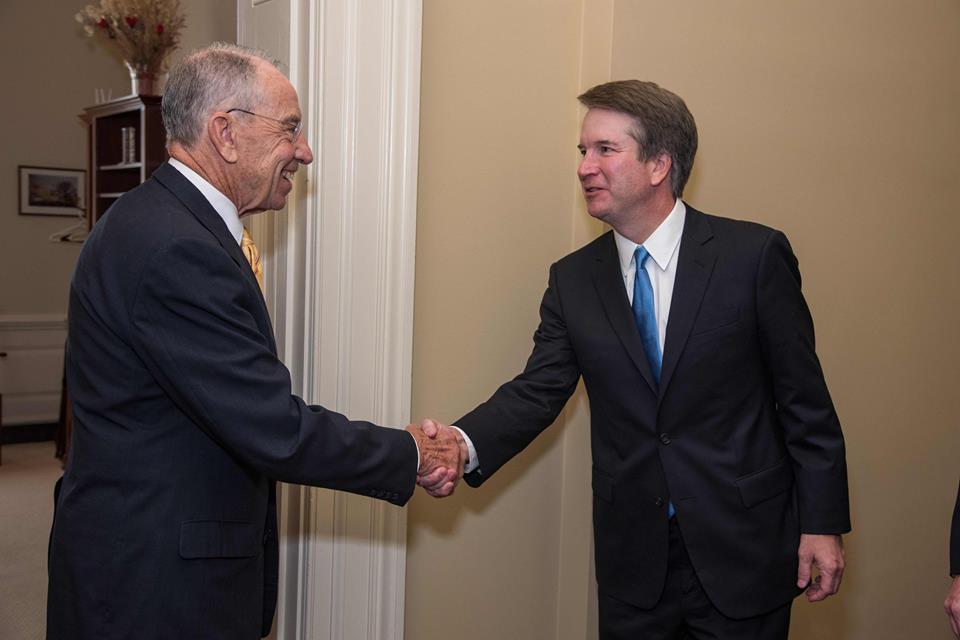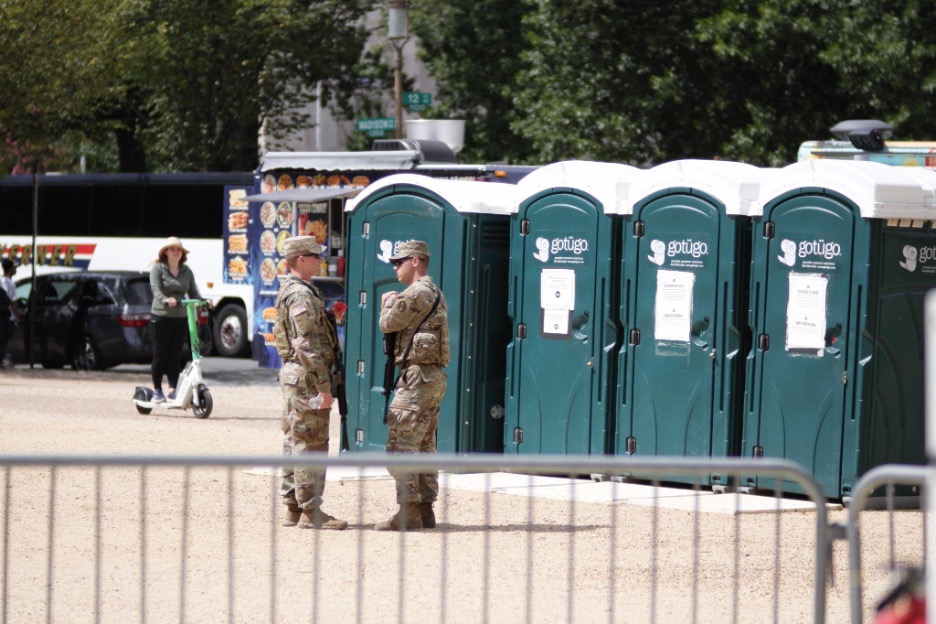Day 1 of Brett Kavanaugh Hearings: Documents Delayed and Documents Denied
A kerfuffle erupted in the Senate Judiciary Committee on Tuesday over the committee’s access to a series of documents from Supreme Court nominee Brett Kavanaugh’s time in the Bush White House. The conflict concerned the withholding of material under an implied assertion of executive privilege and the relevance of the documents in question. There are a few different caches of documents and different reasons why senators do not have access to them.

Published by The Lawfare Institute
in Cooperation With

A kerfuffle erupted in the Senate Judiciary Committee on Tuesday over the committee’s access to a series of documents from Supreme Court nominee Brett Kavanaugh’s time in the Bush White House. The conflict concerned the withholding of material under an implied assertion of executive privilege and the relevance of the documents in question. There are a few different caches of documents and different reasons why senators do not have access to them.
To give context before Kavanaugh’s testimony begins in earnest on Wednesday, what follows is an overview of the three different batches of documents at issue.
The 42,000 Pages
Roughly 42,000 pages (as part of 5,148 documents) from Kavanaugh’s time in the White House Counsel’s office were released to the Senate Judiciary Committee on Monday night. Senate Minority Leader Chuck Schumer was quick to respond that senators were unlikely to have time to review the documents before the hearing began Tuesday. The majority staff on the committee, however, tweeted only three hours later that they had finished their review:
The Majority staff has now completed its review of each and every one of these pages. Chairman @ChuckGrassley and his team are prepped and ready for Judge Kavanaugh's hearing to begin tomorrow. #SCOTUS https://t.co/jrXRU8QMTg
— Senate Judiciary (@senjudiciary) September 4, 2018
Democrats pushed back throughout the proceedings on Tuesday. Sen. Sheldon Whitehouse (D-R.I.) noted during the hearing that reviewing that many documents so quickly would require majority staffers to process documents at a rate of “7000 pages per hour.” Several Senate Democrats asked for delays because of the late production. Sens. Whitehouse and Amy Klobuchar (D-Minn.), for example, repeatedly emphasized that lawyers would not proceed with trials the morning after opposing counsel had related 42,000 pages of documents.
Sen. Kamala Harris (D-Calif.) went so far as to interrupt Judiciary Committee Chairman Chuck Grassley during his opening remarks to say that the hearing could “not possibly move forward” until all committee members had a chance to fully analyze the documents. When Grassley noted that she was “out of order,” several other Democrats objected. Grassley argued, as he would throughout the first day of the hearings, that the committee Republicans or their staff had managed to review the additional records. He also pointed to the thousands of Bush White House documents that had previously been released.
The 100,000 Pages
There is a separate cache of 27,110 documents from Kavanaugh’s days in the White House counsel’s office—consisting of 101,921 pages. These have been withheld from the committee at the direction of the Trump White House and the Justice Department. Lawyers for former President George W. Bush sent a letter, obtained by Buzzfeed, detailing the documents that representatives of President Bush and the National Archives and Records Administration (NARA) provided to the Judiciary Committee. The letter says that every document pertaining to Kavanaugh’s time in the Bush White House—he worked in the White House counsel’s office from 2001 to 2003 and was staff secretary to the president from 2003 to 2006—was provided to the committee with five exceptions:
- Exact duplicates (as identified by third-party software);
- Personal documents not covered under the Presidential Records Act of 1978, 44 U.S.C. §§ 2201–2207;
- State Department records from the 1970s that were subject to Freedom of Information Act (FOIA) requests during Kavanaugh’s tenure at the White House counsel’s office;
- Records from Kavanaugh’s time as staff secretary, which were not requested by the committee;
- Presidential records protected by an assertion of constitutional privilege.
The first category is self-explanatory. On the second, the Bush legal team reportedly deferred to NARA on all determinations regarding whether a document was “personal” and therefore not subject to the Presidential Records Act (PRA).
For the third category, the letter explains that hard copies of several State Department records from the 1970s were found in Kavanaugh’s White House counsel’s office records. It turns out that they had been left in his office for consultation on FOIA requests.The fourth category, documents from Kavanaugh’s tenure as staff secretary, were not provided because they were not requested by Grassley. (This is addressed in more detail later.)
The fourth category is worth deeper explanation. According to Bush’s legal team, 27,110 documents totaling 101,921 pages were not provided to the committee because the Trump White House, in consultation with the Justice Department, identified the content of the documents as traditionally protected by constitutional privilege and “directed” that the documents not be provided to the committee. Note, the objection here did not come from the Bush team but from the Trump administration.
Neither the Bush team nor the Trump administration actually asserts any privilege over the documents; rather, the documents are said to contain information that could be protected under privilege. The Bush team has deferred to the current Justice Department on matters of asserting privilege over the Kavanaugh documents. Their letter even specifies that former President Bush instructed that the documents be reviewed “with a presumption of disclosure.” But the letter also states that the Trump administration has said information identified in the documents has been“traditionally protected by constitutional privilege"—phrasing that suggests that the White House hasn’t directly asserted privilege (at least not yet).
Justice Department spokesperson Sarah Isgur Flores stated that the department, “which has advised both Democratic and Republican administrations” on the application of the PRA and constitutional privilege, takes full responsibility for withholding the documents. She also asserted that the “volume, depth, and breadth” of the production of Kavanaugh documents was far greater than the “much smaller and narrower productions” for past Supreme Court nominees. This may be correct, but there probably is no other nominee whose work in the White House generated anything close to the volume of documents that Kavanaugh’s work there produced.
The Unrequested Documents
The third set of documents at issue are documents from Kavanaugh’s time as staff secretary in the Bush White House. As Sen. Dick Durbin (D-Ill.) wrote on Twitter:
The biggest black hole in Judge Kavanaugh's record is his 35-month tenure as White House Staff Secretary from July 2003 to May 2006. Republicans are not disclosing any documents from this 35-month time period. #WhatAreTheyHiding pic.twitter.com/OpoSnwWEWf
— Senator Dick Durbin (@SenatorDurbin) August 31, 2018
According to Bush’s legal team, the documents were not provided to the committee because Grassley did not request them. The chairman has described the position of staff secretary as an “inbox and outbox of the Oval Office” and argued that it is not the job of the staff secretary to “provide his own substantive work product.” Therefore, Grassley concluded, these documents are “least relevant” to understanding the nominee’s legal thinking.
Republicans have argued that the most important documents for evaluating Kavanaugh’s potential as a Supreme Court justice involve his extensive judicial record—including his more than 300 opinions for the U.S. Court of Appeals for the D.C. Circuit and his law review articles. Democrats, by contrast, argue that his time as staff secretary is crucial for understanding his approach to law, citing this 2010 statement from Judge Kavanaugh:
When people ask me which of my prior experiences has been most useful to me as a judge, I tell them that all of them have been useful, and I certainly draw on all of them. But I also do not hesitate to say that my five and a half years in the White House—and especially my three years as Staff Secretary for President Bush—were the most interesting and in many ways among the most instructive.
Justice Delayed?
In a USA Today op-ed published Monday, Grassley wrote that “the Judiciary Committee has received more pages of executive branch material,” for evaluating Judge Kavanaugh, “than for the previous five Supreme Court justices combined.” This led him to conclude that the concerns voiced by his Democratic Senate colleagues was “not about the documents, it’s about delay.”
On the one hand, the Bush team has provided the committee with 80,788 documents (totaling 267,834 pages) for public release and an additional 47,114 documents (totaling 147,250 pages) for the committee’s own use. Kavanaugh has also produced a wealth of public legal opinions and law review articles (see Lawfare’s analyses of Kavanaugh’s views on national security issues, including a bibliography of his work on national security law, here).
On the other hand, as noted above, Grassley’s volume argument is inherently weak, because a nominee who served for five years in a White House simply generated more relevant executive-branch material than there had been for prior nominees. Moreover, the position on privilege appear to be aggressive, particularly given Bush’s stated preference for transparency. And dumping a large volume of material on committee members the evening before confirmation hearings open is a thumb in the eye of the minority—as is not seeking material the minority has asked to see.
Now that the hearings are underway, it is unlikely that the White House will walk back its position on privilege and unlikely that Grassley will request thousands more documents. In evaluating Kavanaugh’s record, senators and ordinary citizens alike will have to rely on documents to which they already have access.
Ultimately, it appears the Senate Majority Leader Mitch McConnell was right when he reportedly told the White House that Kavanaugh’s “paper trail” would lead to much sturm und drang when confirmation hearings arrived.




.jpg?sfvrsn=8253205e_5)
